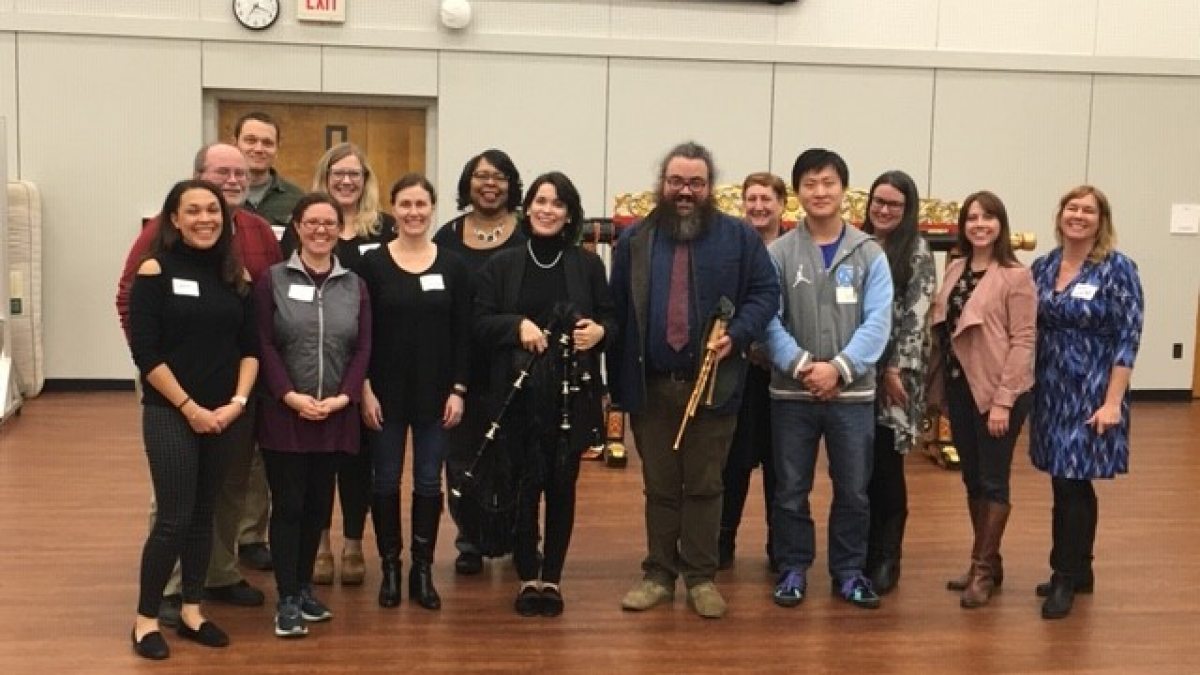Smithsonian Folkways brings global music to K-12 classrooms through UNC World View
UNC World View has partnered with Smithsonian Folkways, the nonprofit record label of the Smithsonian Institution, to distribute free educational materials that incorporate global music into K-12 classrooms.

UNC World View has partnered with Smithsonian Folkways, the nonprofit record label of the Smithsonian Institution, to distribute free educational materials that incorporate global music into K-12 classrooms.
A University of North Carolina at Chapel Hill public service program dedicated to developing global educators, UNC World View created the materials as a part of its Global Music Fellows program. Twelve fellows from throughout North Carolina integrated the music of Abigail Washburn, Andrew W. Mellon Foundation Discovery Through Iterative Learning Fellow at Carolina Performing Arts, and Wu Fei into curriculum materials for educators across multiple grade levels and disciplines.
Three of the lesson plans developed are being shared by Smithsonian Folkways in conjunction with the April 2020 release of their self-titled album, “Wu Fei & Abigail Washburn.” This collaborative debut blends Chinese and Appalachian folk music traditions and features the banjo with the guzheng.
As a part of the Smithsonian Institution, the national museum of the United States, Smithsonian Folkways supports cultural diversity and increased understanding among peoples through the dissemination of audio recordings and educational materials. The UNC World View lesson plans provide teachers with resources to do just that— bring cross-cultural connections to the classroom through music.
“Music has always been a vital part of human expression,” said Holly Loranger, UNC World View assistant director. “It has the power to engage, motivate and inspire students and builds bridges between both what is familiar and what is unfamiliar.”
The featured lessons span grades K-12 and explore body percussion, lullabies around the world and how the creation of music can be influenced by heritage, culture and personal experience. The materials for these plans were produced by three North Carolina educators — Leslie Roberts, a music teacher at Weddington Hills Elementary School in Concord; Karen Richardson, a middle school chorus teacher at Durham Academy; and Erica Hefner, teacher and director of orchestras at Northwest School of the Arts in Charlotte.
The full cohort of UNC World View fellows have been learning and developing materials together since an introductory workshop was held on UNC-Chapel Hill’s campus in July 2019, in conjunction with Carolina Performing Arts. The workshop featured a guzheng demonstration and lecture by Li-ling Hsiao, associate professor of Asian studies, and a talk that contextualized the work of Fei and Washburn by Amanda Graham, associate director of engagement at Carolina Performing Arts.
The fellows then worked throughout the following months researching, writing and peer reviewing materials. As a part of their continued exploration of the relationship between music and culture, the cohort reconvened in January for a mini-workshop featuring a presentation by Tiber Falzett, UNC visiting lecturer of Scottish Gaelic studies, and a discussion and impromptu bagpipe performance with Cristina Pato, internationally acclaimed musician, writer and educator. Following the workshop, the fellows attended a Carolina Performing Arts rendition of “Invisible(s)” with Pato and Mazz Swift, world-renowned violinist and composition artist
The fellows ultimately published a collection of 16 lesson plans this spring to accompany each song of the Fei and Washburn album. All of the educational materials developed, including community college resources, have been distributed to UNC World View’s 91 K-12 district and community college partners and are publicly available on the UNC World View website. The three featured lesson plans are also available online through the Smithsonian Folkways Recordings.
Support for this project was provided in part by the Carolina Asia Center.




